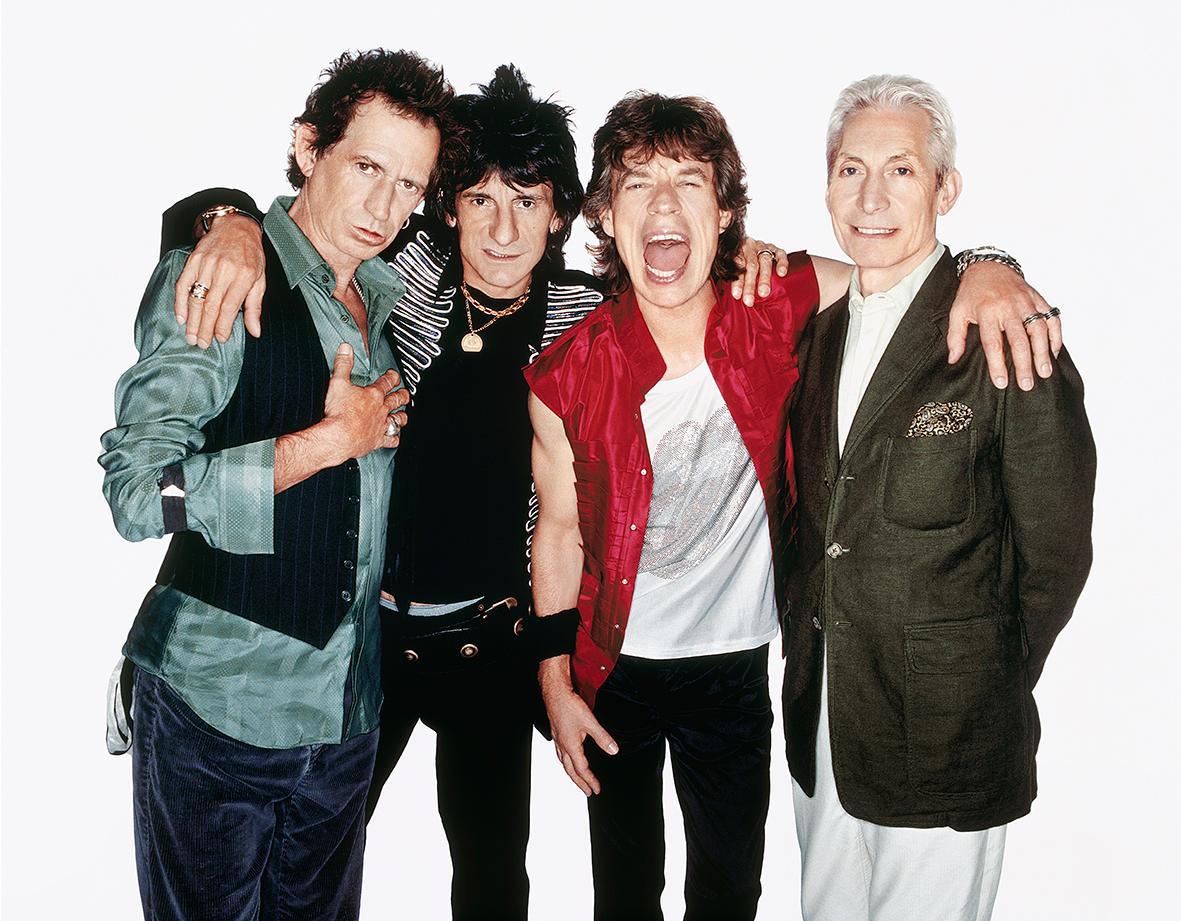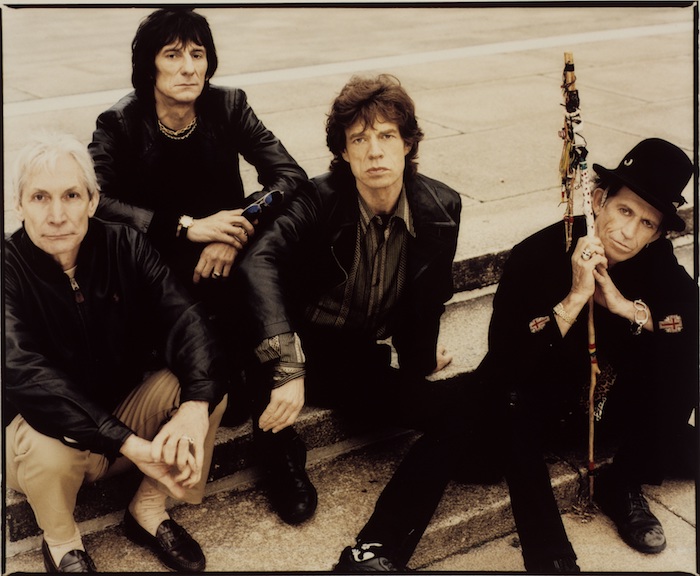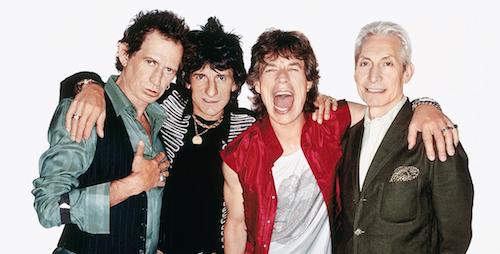
On the eve of the start of the 2021 edition of the No Filter tour, the remaining members of the Rolling Stones have opened up about the loss of their founding drummer, Charlie Watts, as well as the band’s future. The interview, conducted by music journalist David Fricke, was released by the band’s publicity firm today (September 23).
Mick Jagger was asked if he had a special memory of Watts.
“The thing about Charlie was that he was such a quiet guy. I can’t think of that incident when he came into the room and said, ‘We should do this like this!’ I can always remember when he sat down and played ‘Can’t You Hear Me Knocking.’ He established this great rock beat, then switched it to Latin jazz. The thing about Charlie was that he was always there, always played beautifully and was always willing to discuss what to do about it – how he could make it better. He held the band together for so long, musically, because he was the rock the rest of it was built around. We had a lot of wonderful times apart from playing music together. We used to go and watch cricket. And when we’d get together, we didn’t talk about music. We talked about art, which he knew a lot more about than I did. But the thing he brought was this beautiful sense of swing and swerve that most bands wish they could have. We had some really nice conversations in the last couple of years about how all this happened with the band. It’s a huge loss to us all. It’s very, very hard. But we had wonderful times, and Charlie made some wonderful music.”

Keith Richards was asked the same question. “I was jotting down a couple of things that I miss. Charlie had an incredible sense of humor. And my joy was I loved to crack him up. If you could hit that spot, he wouldn’t stop, and it was the funniest thing in the world. He had an incredible sense of humor that he kept to himself unless you sparked it. And then it could be painful to laugh. I can’t think of any one moment, because with Charlie Watts, it was his consistency. A most vital part of being in this band was that Charlie Watts was my bed. I could lay on there, and I know that not only would I have a good sleep, but I’d wake up and it’d still be rocking. It was something I’ve had since I was 19. I never doubted it. I never even thought about it. Only now am I thinking about it. At the same time, I know I have a very good man who understands that in [drummer Steve] Jordan. Without a drummer, you ain’t nowhere.”
Ronnie Wood offered this memory. “It’s quite a famous story. We were at a video shoot, in the trailer backstage, sitting around twiddling our thumbs. And somebody said to him, ‘Charlie, after 30 years, you must have done a lot of hangin’ about like this.’ And he said, ‘Yeah, five years work, 25 years hanging around.’ That kind of sums him up. He certainly had his powerful views. But he said it with his playing. He just spoke through his instrument.”
Each was asked if this would be the final tour.
“I’ve been asked that question since I was 31,” said Jagger. “And your answer is the same,” said the interviewer.
“I don’t know. I mean, anything could happen. You know, if things are good next year and everyone’s feeling good about touring, I’m sure we’ll do shows. I’m just trying to concentrate on this tour now.”
Richards said, “We hit a very difficult point, to take this thing out. But we’re gonna do it. Charlie was prepared for us to go ahead. We were expecting him to pick it up somewhere. Steve was, thankfully, going to be the pickup. But things ain’t turned out that way.”
“I got a feeling that we’re just tickling the surface here,” said Wood. “We’re seeing another unexploded mine. It’s got a lot of time on it.”
They were asked how the rehearsals have been going with Jordan.
“It’s gone well,” said Jagger. “We all knew him, and I’d played with him before. He’s very respectful of Charlie. He played with Keith before we started the rehearsals, and then he did homework, listening to the tunes. When we talk about what Charlie did on this one, we listen to the original record, and then we listen to the live versions. There’s certain licks that we want to do, that Charlie did. There’s certain drum licks that one doesn’t think about, but they’re part of the tune in a way that a bass part or a guitar part is part of the tune.”
Richards offered a slightly different spin. “It’s been chaotic. But thank God, Steve Jordan is a tower of strength as was Charlie Watts. Of course, I’ve been working with Steve for 30-odd years. It was Charlie that recommended Steve to me in the mid-Eighties: ‘Looks like we got some time off. If you’re going to do anything by yourself, there’s your man – Steve Jordan.’ And here he is.”
Wood has also known him for decades. “When I lived in New York, he was always at my house, him and [bassist] Charley Drayton. We were always jamming in my little studio on West 78th Street. We were the Upper West Side Gang with [Bobby] Womack and [Don] Covay. There was a lot of soul exchanged.”
Of the upcoming 2021 tour, Jagger noted, “We’ve rehearsed 80 to 90 songs. I’m not saying we just touched on them, jammed on them. We can actually play them. That’s a huge amount. Keith and I were saying, the reality is that we have to do at least twelve, 13 numbers that most everyone knows.”

Wood mentioned there could be some surprises to the setlist. “There’s things I’ve really enjoyed like “Hand of Fate” [on 1976’s Black and Blue]. And we’re going back down the catalog – ’19th Nervous Breakdown,’ we do a blinding version of that. When we’re playing it, I’m the biggest fan: ‘I can’t believe I got the best seat in the house.’ ‘Street Fighting Man’ has a new energy. ‘Midnight Rambler’ has a new approach. We thought, “Oh dear, how are we going to do ‘Midnight Rambler’? Because there’s another language of its own in that song. It takes its own course now, and Steve, if anything, is leading the charge: ‘I’ll tell ya when it’s gonna speed up, I’ll tell ya when it’s gonna be dynamic.’ To see Keith say, ‘Okay, then, you tell me’ – it was a really different thing. And Mick’s like, ‘Yeah, I’ll take that’.”
Related: Our recap of the Stones’ Sept. 20 warmup concert
They were asked of the band’s early days, when Watts joined in January 1963. Fricke asked Jagger if Watts’ style changed the way he, Richards and Brian Jones played blues and R&B.
“Some jazz drummers don’t want to play that. But he wasn’t one of those. And he wasn’t just a straight rock drummer. We played with rock drummers before. We played with Carlo Little, who used to play with Screaming Lord Sutch’s band. He had two bass drums – it sounded great. But it wasn’t Charlie. Charlie brought another sensibility, the jazz touch. And he didn’t play very heavy. Sometimes, if I got him mad enough, he would. That was the only way I could get him to play really heavy – to get him mad.”
“Mick, Brian and I had been drooling for Charlie for months,” said Richards. “Charlie said, ‘I’d love to play with you guys, but I need a couple of regular gigs.’ Then Charlie started coming to rehearsals, which was all we ever did in those days – rehearse. There never was a gig. Charlie was fascinated by the Chicago drummers – [Jimmy Reed’s drummer] Earl Phillips; Fred Below and Francis Clay [at Chess Records]. To him, they were jazz players, not rock and roll, which of course they weren’t either. Somehow Charlie crossed that fine line. Charlie could make it roll and most drummers have never been able to do that.”
Jagger was asked what convinced Watts to want to join the Stones. “He enjoyed playing the music because it was very eclectic. He was an eclectic drummer. He loved jazz, but let’s be brutal. Jazz doesn’t pay. Of course, we weren’t getting paid much. That’s why he didn’t join us for a long while. We’d ask him to join, but he had a lot of gigs with different bands. Keith and I had already played with Charlie with Alexis Korner. It wasn’t like he came in for an audition. We knew what it was like to play with him, and he knew what it was like to play with us. He fitted in. He gave a swing to the band – the swerve and subtlety. And he could also be straight-ahead when you wanted to be. ‘Get Off of My Cloud’ – there’s nothing particularly subtle about the drumming on that. He could do that. He was in the pocket.”
Richards offered a surprising answer. “I never did ask him that myself: ‘Why the hell did you join us, man?’ I presume it was something he heard in the music we were listening to and trying to play. Also, he had that sense of adventure: ‘I’m just going to be another jazz player in a big pond. Or I can hang with these crazy guys and see where it goes.’ The thing that Charlie and I had from day one was we would cringe at the crassness of show biz and its demands. Charlie would run a mile rather than do a promo. In a way, the difference between Charlie Watts on stage and the person is in the way he dressed: on stage, T-shirt, a pair of leisure pants and a pair of Capezios. That’s it. Whereas in real life, private life, Charlie was Mr. Style, man. His joy was to go to Savile Row and have these suits made. It was his playground. His tailor could tell you more about him than I could.”

Woods has a different perspective, since he joined the band much later.
“My brother Art was playing with Charlie at the time they asked him to join. Charlie said to Art, ‘I’ve got this offer to join the interval band over at the Marquee.’ Art said, ‘Yeah? What are they called?’ ‘They’re called the Rolling Stones. It might be a gig for a year or so.’ That was how I first heard about Charlie. Art would come home and tell me about his friend. Then I saw them at the Richmond Jazz Festival in 1963, and the tent was moving like an elephant. I thought, ‘This looks like a good thing’ – all this Chuck Berry music and blues coming out.
“The Stones got a real steal when they got Charlie. They had other guys before, but Charlie was clearly important to them, because they asked him a couple of times to join. Charlie just did it so much better. It was a natural feel that he had. Nobody had to explain, “I want you to play like this or that.” He just had it straightaway, that Stones feel.”
The Stones’ 2021 tour formally begins on Sept. 26 in St. Louis.
Tickets are available here and here.
[easy_sign_up title=”Sign up for the Best Classic Bands Newsletter”]


1 Comment
Why is it that Daryl Jones input on missing Charlie Watts, seems so irrelevant? Also, are there no current photographs of these champions of rock and roll.